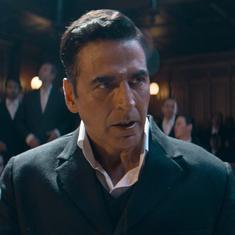This despite cowboy films being rather popular throughout the various “woods”, be it Lolly, Kolly or Bolly. The rough countryside of India with its feudal rural culture has proved to be a worthy template upon which the Mexican, southwestern American motifs of classic cowboy movies can be transplanted. Give Feroz Khan a horse and a cowboy hat, dress Danny Denzongpa up in a headband and colourful vest and you’ve got a credible villain and hero set. The dynamics of exploiting landed classes and oppressed poor folk, macho men and good hearted nautch girls resonate equally with audiences in Minneapolis and Metupaliyam.
But when it comes to emulating or using the ‘sounds’ of rural American music, the white-man’s blues, country and western, relatively few music directors have been to translate the pedal steel and banjo into a desi environment. Interestingly, the Pakistani film Arman, from the early 1960’s starts off with a wonderful Johnny Cash-esque acoustic guitar shuffle and is one of the earliest examples of a ‘country’ flavour in South Asian film music. More recently, in Jai Ho, the super hit from Slumdog Millionaire, A.R. Rahman, ever inventive, splices in a wonderful but short run on the pedal steel about half way through the anthem.
In between the record is real spotty. This week we share several highlights of the “country western” sensibility in the subcontinental filmi universe.
Title Music (Kaala Sona)
R. D. Burman’s title music to the 1975 potboiler Kaala Sona (Black Gold) does an admirable job of lifting the spirit of the theme music of some of the great spaghetti westerns, especially from the Sergio Leone classic, The Good the Bad and the Ugly, which was hugely popular in India as well. Keeping the music going is the obligatory galloping beat so familiar to cowboys and country music.
Jeevan Mein Tu Dharna Nahi (Khote Sikkey)
Feroz Khan was in the 1970’s India’s ultimate cowboy. A B-grade actor for the first half of his career, his success as a desi good guy led him to make the jump into the big time. 1974’s Khote Sikkey was a big hit and this song (again composed by R.D Burman), essentially remakes the C&W standard Ghostriders in the Sky as a vehicle for the great Kishore Kumar.
Title Music (Ganga)
Tamil film has never been far behind Hindi cinema (if not, in fact, leading the way) in exploring innovations. Several years before the two khichidi westerns mentioned above, the Tamil film Ganga played out its story in a cowboy setting. The title music by Shankar Ganesh is far more authentic than that of R.D. Burman’s, bringing in Mexacali trumpets, Spanish guitar and sounds not too far removed from those made by the Baja Marimba Band in the late 60s.
Mera Naam Chin Chin Chu (S. Hazarasingh)
This song from the 1958 film Howrah Bridge is a stone classic of Hindi cinema. O.P Nayyar’s music is lively and Geeta Dutt’s singing absolutely silky and easy flowing. As much as I love the original, this instrumental version by steel guitarist S. Hazarasingh captures with great aplomb the spirit of Duane Eddy, the man who made his name making instrumental C&W hits in the 50s and 60s. The quick step interplay between accordion and steel guitar (which comes close to replicating the sounds of the pedal steel) is an absolute ripper!
Filmein Shilmein (Desi Boyz)
The country western feel to this song from the 2011 film Desi Boyz, sung by Pakistani Shaavar Ali Khan, is a fine example of slick contemporary production values and a real affinity with the spirit of modern commercial country music. Write some new lyrics in English and you’ve got a hit in Nashville, I’m sure of it!










